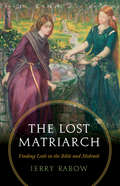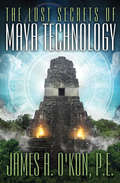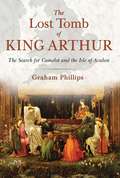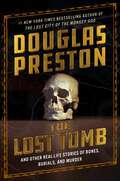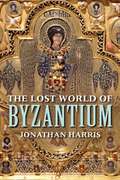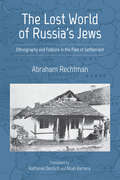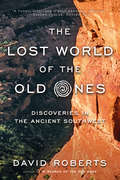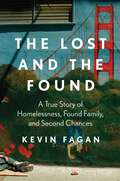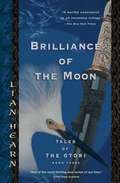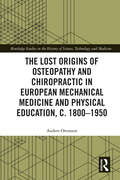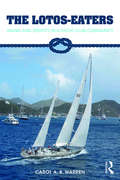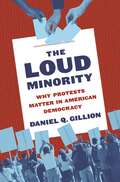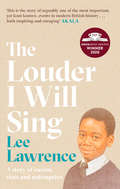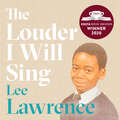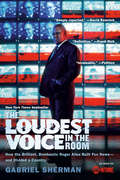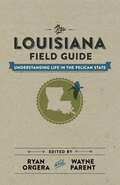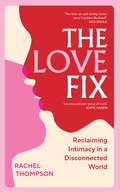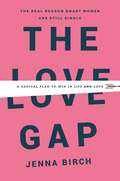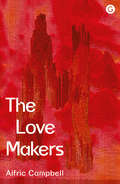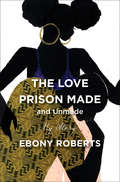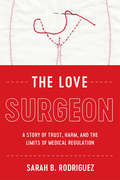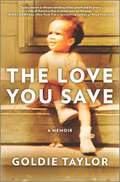- Table View
- List View
The Lost Matriarch: Finding Leah in the Bible and Midrash
by Jerry RabowThe Lost Matriarch offers a unique response to the sparse and puzzling biblical treatment of the matriarch Leah. Although Leah is a major figure in the book of Genesis, the biblical text allows her only a single word of physical description and two lines of direct dialogue. The Bible tells us little about the effects of her lifelong struggles in an apparently loveless marriage to Jacob, the husband she shares with three other wives, including her beautiful younger sister, Rachel. Fortunately, two thousand years of traditional and modern commentators have produced many fascinating interpretations (midrash) that reveal the far richer story of Leah hidden within the text. Through Jerry Rabow’s weaving of biblical text and midrash, readers learn the lessons of the remarkable Leah, who triumphed over adversity and hardship by living a life of moral heroism. The Lost Matriarch reveals Leah’s full story and invites readers into the delightful, provocative world of creative rabbinic and literary commentary. By experiencing these midrashic insights and techniques for reading “between the lines,” readers are introduced to what for many will be an exciting new method of personal Bible interpretation.
The Lost Secrets of Maya Technology
by James A. O'KonThe pioneering archaeo-engineer uncovers the advanced technologies of the Maya—from ancient highways to the concept of zero. The mysteries of the Maya have been a source of fascination since the ancient civilization was discovered in the 19th century. Far more advanced than any civilization in Europe, Maya developed an elegant mathematic system, an incredibly accurate astronomy, and one of the world&’s first written languages. The lost principles of Maya technology allowed ancient engineers to construct grand cities that towered above the rainforest, water systems with underground reservoirs, miles of all-weather paved roads tracking through the jungle, and the longest bridge in the ancient world. Pioneering archeologist and engineer James O&’Kon combined research, field exploration, forensic engineering, and 3-D virtual reconstruction to discover the secrets of Maya technology. Here, O&’Kon recounts how Maya engineers developed structural mechanics for multi-story buildings that were not exceeded in height until the first &“skyscraper&” built in Chicago in 1885; invented the blast furnace 2,000 years before it was patented in England; and developed the vulcanization of rubber more than 2,600 years before Charles Goodyear.
The Lost Tomb of King Arthur: The Search for Camelot and the Isle of Avalon
by Graham PhillipsOne man’s journey to uncover the final resting place of the historical King Arthur • Pinpoints the exact locations of Arthur’s tomb, the ruins of Camelot, and the sword Excalibur using literary research and the latest geophysics equipment • Examines previously unknown ancient manuscripts preserved in the vaults of the British Library--including one written within the living memory of Arthur’s time • Reveals the mythic king as the real-life leader Owain Ddantgwyn, who united the British to repel invasion from Germany around 500 AD One of the most enigmatic figures in world history, King Arthur has been the subject of many fantastical tales over the past 1500 years, leading many scholars to regard him and his fabled city of Camelot simply as myth. But, as Graham Phillips shows through a wealth of literary and scientific evidence, King Arthur was a real man, Camelot a real place, and the legendary Excalibur a real sword--and Phillips has located them all. Phillips examines the earliest stories of Arthur as well as previously unknown ancient manuscripts preserved in the vaults of the British Library in London, such as the work of the 9th-century monk Nennius, to pinpoint the exact locations of Arthur’s tomb, the ruins of Camelot, and the sword Excalibur. He reveals the mythic king as the real-life leader Owain Ddantgwyn, who united the British to repel invasion from Germany around 500 AD. Moving his quest from library vaults to the real sites of Arthur’s life, the author confirms his research through a Dark Age monument, hidden away in the mountains of western Britain, that bears an inscription about a powerful warlord who went by the battle title “Arthur.” He visits archaeological excavations at the ruins of Viroconium, near Wroxeter in Shropshire, clearly identifying the ancient city as Camelot, the fortified capital of Arthur’s Britain. Working with specialist divers and marine archaeologists, he surveys the depths of an ancient lake in the English countryside to reveal the resting place of Excalibur. Enlisting a team of scientists and sophisticated geophysics equipment, he uncovers the lost grave of the historical King Arthur, buried with his shield, just as told in legend. The culmination of 25 years of research, including new translations of primary source material, this book provides the necessary evidence to allow King Arthur to finally be accepted as the authentic British king he was.
The Lost Tomb: And Other Real-Life Stories of Bones, Burials, and Murder
by Douglas PrestonFrom the #1 bestselling author of The Lost City of the Monkey God, a jaw-dropping discovery of an Egyptian tomb opens up a slew of archaeological mysteries and deadly tales. Now in paperback with an EXCITING BONUS ADVENTURE! What&’s it like to be the first to enter an Egyptian burial chamber that&’s been sealed for thousands of years? What horrifying secret was found among the prehistoric ruins of the American Southwest? Who really was the infamous the Monster of Florence? From the jungles of Honduras to macabre archaeological sites in the American Southwest, Douglas Preston's explorations have taken him across the globe. The Lost Tomb brings together a compelling collection of true stories about buried treasure, enigmatic murders, lost tombs, bizarre crimes, and other fascinating tales of the past and present.
The Lost Treasure of the Knights Templar: Solving the Oak Island Mystery
by Steven SoraA compelling argument that connects the lost treasure of the Knights Templar to the mysterious money pit on Oak Island, Nova Scotia, that has baffled treasure hunters for two centuries • Fascinating occult detective work linking the Cathars, the Scottish Masons, and Renne-le-Chateau to the elusive treasure pit on Oak Island • Draws on new evidence recently unearthed in Italy, France, and Scotland to provide a compelling solution to one of the world's most enduring mysteries When the Order of Knights Templar was ruthlessly dissolved in 1307 by King Philip the Fair of France it possessed immense wealth and political power, yet none of the treasure the Templars amassed has ever been found. Their treasure is rumored to contain artifacts of spiritual significance retrieved by the order during the Crusades, including the genealogies of David and Jesus and documents that trace these bloodlines into the royal bloodlines of Merovingian France. Placing a Scottish presence in the New World a century before Columbus, Steven Sora paints a credible scenario that has the Sinclair clan of Scotland transporting the wealth of the Templars--entrusted to them as the Masonic heirs of the order--to a remote island off the shores of present-day Nova Scotia. The mysterious money pit there is commonly believed to have been built before 1497 and has guarded its secret contents tenaciously despite two centuries of determined efforts to unearth it. All of these efforts (one even financed by American president Franklin Delano Roosevelt) have failed, thanks to an elaborate system of booby traps, false beaches, hidden drains, and other hazards of remarkable ingenuity and technological complexity.
The Lost World of Byzantium: The Lost World Of Byzantium
by Jonathan HarrisThe acclaimed author of Byzantium and the Crusades &“offers a fresh take on this fabled but hidden civilization&” across 11 centuries of history (Colin Wells, author of Sailing from Byzantium). For more than a millennium, the Byzantine Empire presided over the juncture between East and West, as well as the transition from the classical to the modern world. Rather than recounting the standard chronology of emperors and battles, leading Byzantium scholar Jonathan Harris focuses each chapter of this engaging history on a succession of archetypal figures, families, places, and events. Harris&’s introduction presents a civilization rich in contrasts, combining orthodox Christianity with paganism, and classical Greek learning with Roman power. Though frequently assailed by numerous armies, Byzantium survived by dint of its unorthodox foreign policy. Over time, its sumptuous art and architecture flourished, helping to establish a deep sense of Byzantine identity in its people. Synthesizing a wealth of sources to cover all major aspects of the empire&’s social, political, military, religious, cultural, and artistic history, Harris&’s study illuminates the heart of Byzantine civilization and explores its remarkable and lasting influence on the modern world.
The Lost World of Russia's Jews: Ethnography and Folklore in the Pale of Settlement (Jews in Eastern Europe)
by Abraham RechtmanIn 1913, Abraham Rechtman journeyed through the Russian Pale of Settlement on a mission to record its Jewish folk traditions before they disappeared forever. The Lost World of Russia's Jews is the first English translation of his extraordinary experiences, originally published in Yiddish, documenting a culture best known until now through romanticized works like Life Is with People and Fiddler on the Roof. In the last years of the Russian Empire, Abraham Rechtman joined S. An-sky's Jewish Ethnographic Expedition to explore and document daily life in the centuries old Jewish communities of the Pale of Settlement. Rechtman described the key places where Jewish life and death were experienced and connected these sites to local folklore and customary practices. Among the many unique contributions of his memoir are riveting descriptions of traditional Jewish healers and exorcists—many of them women—and their methods and incantations.Rather than a nostalgic portrait of an imagined shtetl, Rechtman succeeded in producing an intimate account of Jewish life and death that is highly nuanced and richly detailed. The Lost World of Russia's Jews powerfully illuminates traditional Jewish life in Eastern Europe on the eve of its transformation and, ultimately, destruction.
The Lost World of the Old Ones: Discoveries in the Ancient Southwest
by David RobertsAn award-winning author and veteran mountain climber takes us deep into the Southwest backcountry to uncover secrets of its ancient inhabitants. For more than 5,000 years the Ancestral Puebloans--Native Americans who flourished long before the first contact with Europeans--occupied the Four Corners region of the southwestern United States. Just before AD 1300, they abandoned their homeland in a migration that remains one of prehistory's greatest puzzles. Northern and southern neighbors of the Ancestral Puebloans, the Fremont and Mogollon likewise flourished for millennia before migrating or disappearing. Fortunately, the Old Ones, as some of their present-day descendants call them, left behind awe-inspiring ruins, dazzling rock art, and sophisticated artifacts ranging from painted pots to woven baskets. Some of their sites and relics had been seen by no one during the 700 years before David Roberts and his companions rediscovered them. In The Lost World of the Old Ones, Roberts continues the hunt for answers begun in his classic book, In Search of the Old Ones. His new findings paint a different, fuller portrait of these enigmatic ancients--thanks to the breakthroughs of recent archaeologists. Roberts also recounts his last twenty years of far-flung exploits in the backcountry with the verve of a seasoned travel writer. His adventures range across Utah, Arizona, New Mexico, and southwestern Colorado, illuminating the mysteries of the Old Ones as well as of the more recent Navajo and Comanche. Roberts calls on his climbing and exploratory expertise to reach remote sanctuaries of the ancients hidden within nearly vertical cliffs, many of which are unknown to archaeologists and park rangers. This ongoing quest combines the shock of new discovery with a deeply felt connection to the landscape, and it will change the way readers experience, and imagine, the American Southwest.
The Lost and the Found: A True Story of Homelessness, Found Family, and Second Chances
by Kevin FaganIn the tradition of Stephanie Land and Matthew Desmond, a powerful and deeply reported narrative of homelessness, despair, and hope.Kevin Fagan&’s The Lost and the Found, set in San Francisco—one of the wealthiest cities in America—takes an empathic, character-driven approach to exploring the human side of what&’s behind the homelessness epidemic. An award-winning journalist and Pulitzer Prize nominee who has covered homelessness for decades and spent extensive time on the streets for his reporting, Fagan experienced it himself as a young man and brings a deep understanding to the crisis. He introduces us to Rita and Tyson, telling the deeply moving story of two unhoused people rescued by their families with the help of Fagan&’s reporting, and their struggle to pull themselves out of homelessness and addiction, ending with both enormous tragedy and triumph. But The Lost and the Found is not just a story of individuals experiencing homelessness, it is also a compelling look at the link between homelessness and addiction, and an incisive commentary on housing and equality. Fagan shines a sharp light on this national calamity, and in sharing Rita and Tyson&’s stories, The Lost and the Found has the potential to change the way we see and help the homeless.
The Lost of Art of Walking
by Geoff NicholsonHow we walk, where we walk, why we walk tells the world who and what we are. Whether it's once a day to the car, or for long weekend hikes, or as competition, or as art, walking is a profoundly universal aspect of what makes us humans, social creatures, and engaged with the world. Cultural commentator, Whitbread Prize winner, and author of Sex Collectors Geoff Nicholson offers his fascinating, definitive, and personal ruminations on the literature, science, philosophy, art, and history of walking. Nicholson finds people who walk only at night, or naked, or in the shape of a cross or a circle, or for thousands of miles at a time, in costume, for causes, or for no reason whatsoever. He examines the history and traditions of walking and its role as inspiration to artists, musicians, and writers like Bob Dylan, Charles Dickens, and Buster Keaton. In The Lost Art of Walking, he brings curiosity, imagination, and genuine insight to a subject that often strides, shuffles, struts, or lopes right by us. .
The Lost origins of Osteopathy and Chiropractic in European Mechanical Medicine and Physical Education, c. 1800-1950 (Routledge Studies in the History of Science, Technology and Medicine)
by Anders OttossonThis book examines the global history of allegedly scientific “mechanical” cures commonly used to combat internal and chronic diseases and explores how and why the professional demarcation between orthodox and irregular medicine evolved.Now globally dispersed, the systems of osteopathy and chiropractic are considered as unique pieces of therapeutic Americana with no obvious inspirational counterpart found in the Old World. It is their similar monocausal and biomedically strange etiologies that have given them this status, namely that dislocations and subluxations of joints in the spine were the main source of disease. At the end of the 19th century, when osteopathy and chiropractic materialized in the USA, this was a spectacular claim. Notably, the Germ theory had its breakthrough, yet early osteopaths and chiropractors did not recognize it in favor of their dislocations and subluxations. This book presents a new answer regarding what formed their etiologies. Through a combination of many unutilized source materials with novel theoretical and methodical approaches, the systems of osteopathy and chiropractic are traced back and related to a seminal yet overlooked 19th-century European discourse of so-called mechanical medicine, which also permeated the USA.Shedding new light on the professionalization and gendering of the modern healthcare system, this volume will be of value to students and scholars alike interested in the history of science, technology and medicine.
The Lotos-Eaters: Aging and Identity in a Yacht Club Community
by Carol A. WarrenAs the baby boom generation ages, there are few ethnographies that capture the dynamics of aging. This new book is based on years of participant observation in "the Sands," a beautiful ocean community of well-off individuals and couples seeking the easy life. Yet the community members contend with deep uncertainties about health as they learn to face the realities of death. Identity, sexuality, gender, and conflict play into a sense of "who belongs where," who is counted a friend or stranger in the struggles of old age. Warren shows how the vicissitudes of the aging body center the present and become anchors for the past and future. Expressed in beautiful literary prose, this book moves beyond wealth to explore the realities of aging in poignant new ways that will enliven discussion in courses on Gerontology, Medical Sociology, Inequality, and many others.
The Loud Minority: Why Protests Matter in American Democracy (Princeton Studies in Political Behavior #20)
by Professor Daniel Q. GillionHow political protests and activism have a direct influence on voter and candidate behavior The “silent majority”—a phrase coined by Richard Nixon in 1969 in response to Vietnam War protests and later used by Donald Trump as a campaign slogan—refers to the supposed wedge that exists between protestors in the street and the voters at home. The Loud Minority upends this view by demonstrating that voters are in fact directly informed and influenced by protest activism. Consequently, as protests grow in America, every facet of the electoral process is touched by this loud minority, benefiting the political party perceived to be the most supportive of the protestors’ messaging.Drawing on historical evidence, statistical data, and detailed interviews about protest activity since the 1960s, Daniel Gillion shows that electoral districts with protest activity are more likely to see increased voter turnout at the polls. Surprisingly, protest activities are also moneymaking endeavors for electoral politics, as voters donate more to political candidates who share the ideological leanings of activists. Finally, protests are a signal of political problems, encouraging experienced political challengers to run for office and hurting incumbents’ chances of winning reelection. The silent majority may not speak by protesting themselves, but they clearly gesture for social change with their votes.An exploration of how protests affect voter behavior and warn of future electoral changes, The Loud Minority looks at the many ways that activism can shape democracy.
The Louder I Will Sing: A story of racism, riots and redemption: Winner of the 2020 Costa Biography Award
by Lee LawrenceWINNER OF THE COSTA BIOGRAPHY PRIZE 2020 'This is the story of arguably one of the most important, yet least known, events in modern British history. Lee's journey and fight for justice are both inspiring and enraging' AKALA What would you do if the people you trusted to uphold the law committed a crime against you? Who would you turn to? And how long would you fight them for? On 28th September 1985, Lee Lawrence's mother Cherry Groce was wrongly shot by police during a raid on her Brixton home. The bullet shattered her spine and she never walked again. In the chaos that followed, 11-year-old Lee watched in horror as the News falsely pronounced his mother dead. In Brixton, already a powder keg because of the deep racism that the community was experiencing, it was the spark needed to trigger two days of rioting that saw buildings brought down by petrol bombs, cars torched and shops looted. But for Lee, it was a spark that lit a flame that would burn for the next 30 years as he fought to get the police to recognise their wrongdoing. His life had changed forever: he was now his mother's carer, he had seen first-hand the prejudice that existed in his country, and he was at the mercy of a society that was working against him. And yet that flame - for justice, for peace, for change - kept him going. The Louder I Will Sing is a powerful, compelling and uplifting memoir about growing up in modern Britain as a young Black man. It's a story both of people and politics, of the underlying racism beneath many of our most important institutions, but also the positive power that hope, faith and love can bring in response.
The Louder I Will Sing: A story of racism, riots and redemption: Winner of the 2020 Costa Biography Award
by Lee LawrenceWINNER OF THE COSTA BIOGRAPHY PRIZE 2020 'This is the story of arguably one of the most important, yet least known, events in modern British history. Lee's journey and fight for justice are both inspiring and enraging' AKALA What would you do if the people you trusted to uphold the law committed a crime against you? Who would you turn to? And how long would you fight them for? On 28th September 1985, Lee Lawrence's mother Cherry Groce was wrongly shot by police during a raid on her Brixton home. The bullet shattered her spine and she never walked again. In the chaos that followed, 11-year-old Lee watched in horror as the News falsely pronounced his mother dead. In Brixton, already a powder keg because of the deep racism that the community was experiencing, it was the spark needed to trigger two days of rioting that saw buildings brought down by petrol bombs, cars torched and shops looted. But for Lee, it was a spark that lit a flame that would burn for the next 30 years as he fought to get the police to recognise their wrongdoing. His life had changed forever: he was now his mother's carer, he had seen first-hand the prejudice that existed in his country, and he was at the mercy of a society that was working against him. And yet that flame - for justice, for peace, for change - kept him going.The Louder I Will Sing is a powerful, compelling and uplifting memoir about growing up in modern Britain as a young Black man. It's a story both of people and politics, of the underlying racism beneath many of our most important institutions, but also the positive power that hope, faith and love can bring in response.
The Louder I Will Sing: A story of racism, riots and redemption: Winner of the 2020 Costa Biography Award
by Lee LawrenceWINNER OF THE COSTA BIOGRAPHY PRIZE 2020 This audiobook includes an exclusive interview with Candice Brathwaite and Lee Lawrence'This is the story of arguably one of the most important, yet least known, events in modern British history. Lee's journey and fight for justice are both inspiring and enraging. That it has taken this long for the story of the shooting of Cherry Groce to become properly publicly retold is in itself another tragedy. We can only hope that Britain learns from the valuable lessons contained in these pages' - AkalaWhat would you do if the people you trusted to uphold the law committed a crime against you? Who would you turn to? And how long would you fight them for? On 28th September 1985, Lee Lawrence's mother Cherry Groce was wrongly shot by police during a raid on her Brixton home. The bullet shattered her spine and she never walked again. In the chaos that followed, 11-year-old Lee watched in horror as the News falsely pronounced his mother dead. In Brixton, already a powder keg because of the deep racism that the community was experiencing, it was the spark needed to trigger two days of rioting that saw buildings brought down by petrol bombs, cars torched and shops looted. But for Lee, it was a spark that lit a flame that would burn for the next 30 years as he fought to get the police to recognise their wrongdoing. His life had changed forever: he was now his mother's carer, he had seen first-hand the prejudice that existed in his country, and he was at the mercy of a society that was working against him. And yet that flame - for justice, for peace, for change - kept him going.The Louder I Will Sing is a powerful, compelling and uplifting memoir about growing up in modern Britain as a young Black man. It's a story both of people and politics, of the underlying racism beneath many of our most important institutions, but also the positive power that hope, faith and love can bring in response.
The Loudest Voice in the Room: How the Brilliant, Bombastic Roger Ailes Built Fox News--and Divided a Country
by Gabriel ShermanA deeply reported journey inside the secretive world of Fox News and the life of its combative, visionary founder. When Rupert Murdoch enlisted Roger Ailes to launch a cable news network in 1996, American politics and media changed forever. Now, with a remarkable level of detail and insight, New York magazine reporter Gabriel Sherman brings Ailes's unique genius to life, along with the outsize personalities--Bill O'Reilly, Sean Hannity, Megyn Kelly, Sarah Palin, Karl Rove, Glenn Beck, Mike Huckabee, and others--who have helped Fox News play a defining role in the great social and political controversies of the past two decades. From the Clinton-Lewinsky scandal to the Bush-Gore recount, from the war in Iraq to the Tea Party attack on the Obama presidency, Roger Ailes has developed an unrivaled power to sway the national agenda. Even more, he has become the indispensable figure in conservative America and the man any Republican politician with presidential aspirations must court. How did this man, whose life story has until now been shrouded in myth, become the master strategist of our political landscape? In revelatory detail, Sherman chronicles the rise of Ailes, a sickly kid from an Ohio factory town who, through sheer willpower, the flair of a showman, fierce corporate politicking, and a profound understanding of the priorities of middle America, built the most influential television news empire of our time. Drawing on hundreds of interviews with Fox News insiders past and present, Sherman documents Ailes's tactical acuity as he battles the press, business rivals, and countless real and perceived enemies inside and outside Fox. Sherman takes us inside the morning meetings in which Ailes and other high-level executives strategize Fox's presentation of the news to advance Ailes's political agenda; provides behind-the-scenes details of Ailes's crucial role as finder and shaper of talent, including his sometimes rocky relationships with Fox News stars such as O'Reilly and Hannity; and probes Ailes's fraught partnership with his equally brash and mercurial boss, Rupert Murdoch. Roger Ailes's life is a story worthy of Citizen Kane. The Loudest Voice in the Room is an extraordinary feat of reportage with a compelling human drama at its heart.
The Louisiana Field Guide: Understanding Life in the Pelican State
by Anthony Lewis Karen Williams Michael Pasquier Alecia P. Long Alex V. Cook Barry Cowan Wayne Parent Kent Mathewson Thomas Klingler Ryan Orgera J. Michael Desmond David Harlan Raynie Harlan Joyce Jackson Aaron Emmitte Sylvie DuBois Zachary GodshallIn Louisiana, every bite of food and each turn of phrase is an expression of cultural literacy. Correctly pronouncing "Tchoupitoulas" or "Atchafalaya," knowing the difference between the first Governor Long and the second one, being able to spot the artwork of Caroline Durieux, and honoring the distinction between a Creole and a Cajun roux serve not just as markers of familiarity; they represent acts of preservation. The Louisiana Field Guide: Understanding Life in the Pelican State expands on this everyday communion of history, delving into the cultural patchwork that makes the Gumbo State both thoroughly American and absolutely singular.An authoritative lineup of contributors reintroduces Louisiana through the lenses of environment, geography, history, politics, religion, culture, language, sports, literature, film, music, architecture, food, and art. Whether describing the archi-tectural details of the Ursuline Convent in the French Quarter or sharing the family history of Bourgeois' Meat Market just outside of Thibodaux, the essays in The Louisiana Field Guide present a fresh and expansive look at the enchanting and perplexing Pelican State.At once an accessible primer and a rich omnibus, this volume explores the well-known destinations and far-flung corners of Louisiana, from Cameron Parish to Congo Square, offering an enlightening companion guide for visitors and a trust-worthy reference for residents.
The Louisiana Scalawags: Politics, Race, and Terrorism during the Civil War and Reconstruction
by Frank J. WettaDuring the Civil War and Reconstruction, the pejorative term "scalawag" referred to white southerners loyal to the Republican Party. With the onset of the federal occupation of New Orleans in 1862, scalawags challenged the restoration of the antebellum political and social orders. Derided as opportunists, uneducated "poor white trash," Union sympathizers, and race traitors, scalawags remain largely misunderstood even today. In The Louisiana Scalawags, Frank J. Wetta offers the first in-depth analysis of these men and their struggle over the future of Louisiana. A significant assessment of the interplay of politics, race, and terrorism during Reconstruction, this study answers an array of questions about the origin and demise of the scalawags, and debunks much of the negative mythology surrounding them.Contrary to popular thought, the southern white Republicans counted among their ranks men of genuine accomplishment and talent. They worked in fields as varied as law, business, medicine, journalism, and planting, and many held government positions as city officials, judges, parish officeholders, and state legislators in the antebellum years. Wetta demonstrates that a strong sense of nationalism often motivated the men, no matter their origins.Louisiana's scalawags grew most active and influential during the early stages of Reconstruction, when they led in founding the state's Republican Party. The vast majority of white Louisianans, however, rejected the scalawags' appeal to form an alliance with the freedmen in a biracial political party. Eventually, the influence of the scalawags succumbed to persistent terrorism, corruption, and competition from the white carpetbaggers and their black Republican allies. By then, the state's Republican Party consisted of white political leaders without any significant white constituency. According to Wetta, these weaknesses, as well as ineffective federal intervention in response to a Democratic Party insurgency, caused the Republican Party to collapse and Reconstruction to fail in Louisiana.
The Love Fix: Reclaiming Intimacy in a Disconnected World
by Rachel ThompsonAS SEEN IN THE GUARDIAN | 'Required reading for every person dating' Beth Ashley | 'Brilliant... has revolutionised conversations around love and modern dating ' Shahed Ezaydi | 'So well-researched and insightful' Radhika Sanghani | 'An important feminist voice and a spectacular writer' Sofie Hagen | 'The best sex and dating writer since Candace Bushnell Gigi EngleSwiping, situationships, love-bombing, ghosting, healing... Dating is hard. Why has making connections never felt so simple, yet keeping them has never been so complicated? Sex and dating journalist Rachel Thompson has spent the past decade investigating how we seduce, perceive and treat each other in our post-dating apps era. Written for all, but with particular care for marginalised communities, this book explores questions such as:Why are our odds of finding someone compatible 1 in 562? What does ‘the spark’ actually mean from a scientific perspective? How does technology warp our communication, standards and self-esteem? Why are we becoming more sensitive to rejection? What does real emotional availability look like?Weaving Thompson's personal anecdotes with expert research and interviews with real people, mental-health professionals and sociologists, this book is a rallying cry for radical intimacy and a key resource for protecting your wellbeing and establishing healthy communication and boundaries: paving the way for love beyond the algorithm.
The Love Gap: A Radical Plan to Win in Life and Love
by Jenna BirchA research-based guide to navigating the newest dating phenomenon--"the love gap"--and a trailblazing action plan to help smart, confident, career-driven women find (and keep) their match.For a rising generation young women, the sky is the limit. Women can be anything and have everything. They are outpacing their male peers in higher education and earning the corner office at work. Smart, driven, assertive women are succeeding at just about everything they do--except romance.Why are so many men afraid to date smart women?Modern men claim to want smarts, success, and independence in romantic partners. Or so says the data collected by scientists and dating websites. If that's the case, why are so many independent, successful women winning in life, but losing in love? Journalist Jenna Birch has finally named the perplexing reason: "the love gap"--or that confusing rift between who men say they want to date and who they actually commit to. Backed by extensive data, research, in-depth interviews with experts and real-life relationship stories, THE LOVE GAP is the first book to explore the most talked-about dating trend today. The guide also establishes a new framework for navigating modern relationships, and the tricky new gender dynamics that impact them. Women can, and should, have it all without settling.
The Love Makers
How artificial intelligence and robotics are transforming the future of love and desire: a philosophical thriller and essays.A chance encounter between two women and a road trip into the future: It's Christmas Eve, and Scarlett, banker-turned-technologist, is leaving a secret underground lab to catch the last flight that will get her home in time to open presents with her three-year-old son. She offers a lift to a young woman in distress, who shares her intimate life story as they drive to the airport. These revelations will have devastating consequences for both of them. The Love Makers is a philosophical thriller about female friendship, class, motherhood, women, and work--and how artificial intelligence and robotics are transforming the future of love and desire. Aifric Campbell combines her novel with essays from leading scientists and commentators who examine what's at stake in our human-machine relationships. What is our future as friends, parents, lovers? Will advances in intelligent machines reverse decades of progress for women? From robot nannies to generative art and our ancient dreams of intelligent machines, The Love Makers blends storytelling with science communication to investigate the challenges and opportunities of emergent technologies and how we want to live. ContributorsRonny Bogani, Joanna J. Bryson, Julie Carpenter, Stephen Cave, Anita Chandran, Peter R. N. Childs, Kate Devlin, Kanta Dihal, Mary Flanagan, Margaret Rhee, Amanda Sharkey, Roberto Trotta, E. R. Truitt, and Richard Watson
The Love Prison Made and Unmade: My Story
by Ebony RobertsWith echoes of Just Mercy and An American Marriage, a remarkable memoir of a woman who falls in love with an incarcerated man—a poignant story of hope and disappointment that lays bare the toll prison takes not only on those behind bars, but on their families and relationships.Ebony’s parents were high school sweethearts and married young. By the time Ebony was born, the marriage was disintegrating. As a little girl she witnessed her parents’ brutal verbal and physical fights, fueled by her father’s alcoholism. Then her father tried to kill her mother. Those experiences drastically affected the way Ebony viewed love and set the pattern for her future romantic relationships. Despite being an educated and strong-minded woman determined not to repeat the mistakes of her parents—she would have a fairytale love—Ebony found herself drawn to bad-boys: men who cheated; men who verbally abused her; men who disappointed her. Fed up, she swore to wait for the partner God chose for her.Then she met Shaka Senghor. Though she felt an intense spiritual connection, Ebony struggled with the idea that this man behind bars for murder could be the good love God had for her. Through letters and visits, she and Shaka fell deeply in love. Once Shaka came home, Ebony thought the worst was behind them. But Shaka’s release was the beginning of the end. The Love Prison Made and Unmade is heartfelt. It reveals powerful lessons about love, sacrifice, courage, and forgiveness; of living your highest principles and learning not to judge someone by their worst acts. Ultimately, it is a stark reminder of the emotional cost of American justice on human lives—the partners, wives, children, and friends—beyond the prison walls.
The Love Surgeon: A Story of Trust, Harm, and the Limits of Medical Regulation (Critical Issues in Health and Medicine)
by Sarah B. RodriguezDr. James Burt believed women’s bodies were broken, and only he could fix them. In the 1950s, this Ohio OB-GYN developed what he called “love surgery,” a unique procedure he maintained enhanced the sexual responses of a new mother, transforming her into “a horny little house mouse.” Burt did so without first getting the consent of his patients. Yet he was allowed to practice for over thirty years, mutilating hundreds of women in the process. It would be easy to dismiss Dr. Burt as a monstrous aberration, a modern-day Dr. Frankenstein. Yet as medical historian Sarah Rodriguez reveals, that’s not the whole story. The Love Surgeon asks tough questions about Burt’s heinous acts and what they reveal about the failures of the medical establishment: How was he able to perform an untested surgical procedure? Why wasn’t he obliged to get informed consent from his patients? And why did it take his peers so long to take action? The Love Surgeon is both a medical horror story and a cautionary tale about the limits of professional self-regulation.
The Love You Save: A Memoir
by Goldie Taylor*A Zibby's Most Anticipated Book of 2023**One of The Root's Most Anticipated Books of January**A Good Morning America Best Book of January?**An Essence Must Read Book of the Year*&“The Love You Save will console and inspire countless people."—J.R. Moehringer, New York Times bestselling author of The Tender BarI Know Why the Caged Bird Sings meets Educated in this harrowing, deeply hopeful memoir of family, faith and the power of books—from acclaimed journalist and human rights activist Goldie Taylor Aunt Gerald takes in anyone who asks, but the conditions are harsh. For her young niece Goldie Taylor, abandoned by her mother and coping with trauma of her own, life in Gerald&’s East St. Louis comes with nothing but a threadbare blanket on the living room floor. But amid the pain and anguish, Goldie discovers a secret. She can find kinship among writers like James Baldwin and Toni Morrison. She can find hope in a nurturing teacher who helps her find her voice. And books, she realizes, can save her life. Goldie Taylor's debut memoir shines a light on the strictures of race, class and gender in a post–Jim Crow America while offering a nuanced, empathetic portrait of a family in a pitched battle for its very soul.Profoundly moving, exquisitely rendered and ultimately uplifting, The Love You Save is a story about hidden strength, perseverance against unimaginable odds, the beauty and pain of girlhood, and the power of the written word.
